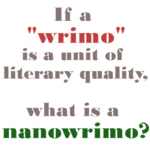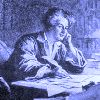
 Recently, a writer friend of mine (let’s call this person T) sent me a link to a story at The Onion shredding the pretensions of a bad writer who has no idea he’s a bad writer, called “Novelist Has Whole Shitty World Plotted Out.”
Recently, a writer friend of mine (let’s call this person T) sent me a link to a story at The Onion shredding the pretensions of a bad writer who has no idea he’s a bad writer, called “Novelist Has Whole Shitty World Plotted Out.”
Explaining the link, T had added a simple message: “God, this makes me self-conscious as hell.”
There is no reason to be self-conscious, because T is one of the best writers I know, published or not, and one of the few writers whose voice moves me to envy. Reading Stephen King’s On Writing: A Memoir of the Craft , I was repeatedly reminded of T’s writing by King’s easy and evocative style. T is a natural.
, I was repeatedly reminded of T’s writing by King’s easy and evocative style. T is a natural.
At the same time, another friend of mine asked me to read a story written by an acquaintance, whom we will call C. C has been writing for years, is well-educated, and well-versed in all the Do’s & Don’ts of writery. Yet, lurking in the first paragraph were half a dozen cringe-worthy mistakes that any decent writer should know to avoid. As I read on, it didn’t get better, so I reluctantly told my friend that I thought the story was quite awful.
We were each relieved to find the other in agreement.
Yet, while T is hesitant despite natural talent, C is determined and confident all out of proportion to reality. I had stumbled onto a perfect case study in the contrast between over-confident yet lousy writers and talented yet self-doubting writers, demonstrating the perverse influence the “Dunning-Kruger Effect” has on literature, a problem I have discussed before.
_
Continue reading →

 “I’ll Be Waiting,” a short story in The Simple Art of Murder
“I’ll Be Waiting,” a short story in The Simple Art of Murder by Raymond Chandler.




 Despite a few persistent voices decrying NaNoWriMo as an insincere stunt that overwhelming results in unreadable dreck, the yearly binge-writing contests inspires armies of cheerleaders who vociferously chant out its virtues … and drown out its critics.
Despite a few persistent voices decrying NaNoWriMo as an insincere stunt that overwhelming results in unreadable dreck, the yearly binge-writing contests inspires armies of cheerleaders who vociferously chant out its virtues … and drown out its critics.
 My
My 
 I was hesitant to read Stephen King’s
I was hesitant to read Stephen King’s  Recently, a writer friend of mine (let’s call this person T) sent me a link to a story at The Onion shredding the pretensions of a bad writer who has no idea he’s a bad writer, called “
Recently, a writer friend of mine (let’s call this person T) sent me a link to a story at The Onion shredding the pretensions of a bad writer who has no idea he’s a bad writer, called “
 In
In  In
In  In
In  In
In